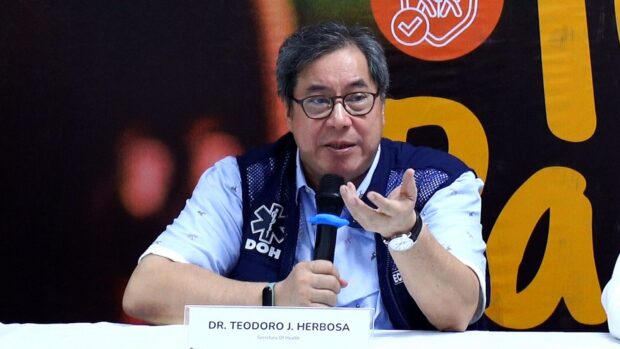
Health Secretary Teodoro Herbosa —INQUIRER.net / Arnel Tacson
MANILA, Philippines — Saying that the P451.4-billion Philippine Health Insurance Corp. (PhilHealth) could continue to provide services, Health Secretary Teodoro Herbosa has recommended that President Ferdinand Marcos Jr. again defer premium increases this year to ease the financial burden on Filipinos.
However, the P873.15-billion Home Development Mutual Fund, commonly known as the Pag-Ibig Fund, announced on Tuesday that it would finally implement this year the premium hikes that were approved in 2019 but suspended due to the pandemic so that loan disbursements would not exceed loan payments and members’ contributions.
Despite the nonimplementation of premium increases, Pag-Ibig reported savings of P80 billion in 2022 and record revenues of P20.6 billion in 2023.
PhilHealth has not released its financial reports for 2023, but in 2022, the state health insurer reported a net income of P148.2 billion even with members’ premiums suspended.
The two state firms differed, however, in that Pag-Ibig’s increases stemmed from a resolution issued by its board of directors while PhilHealth’s were required by Republic Act No. 11223, or the Universal Healthcare Act of 2019.
Still, Herbosa said that he needed “good actuarials on this one. You need to have a science-based policy. We cannot just raise [members’ contributions] on a whim. There are other things that are supporting our health-care system.”
Moreover, PhilHealth’s announced increase included all .500-percentage point increases scheduled for 2021, 2022 and 2023 plus 2024, or a total of 2 percentage points. The rate was at 3.0 percent when it was first deferred in 2021.
“If ever the President will agree to [the increase in] contributions, my recommendation is to start from where we stopped, not the current [proposal of] 5 percent. We should start at where it was suspended,” Herbosa explained.
“That for me is the logical way to lift the suspension. We don’t jump to a very high contribution rate because the people will suffer,” he said.
“My position is that I think PhilHealth has enough money to actually continue to give benefits. It will not be hurt by delaying the increase in premium,” he added. “The law has good intentions to expand and improve the quality of packages offered by PhilHealth. It has been implemented well. The problem is prices of commodities are rising as well. It is not the right time [to implement the 5-percent premium rate],” Herbosa said.
“I know PhilHealth is healthy with a very good reserve and very good investments,” he noted.
While PhilHealth maintained that the fiscal position of the agency remained “strong and robust,” PhilHealth president Emmanuel Ledesma said the state firm could still pursue plans to expand at least six benefit packages even if the president again suspends the contribution increase.